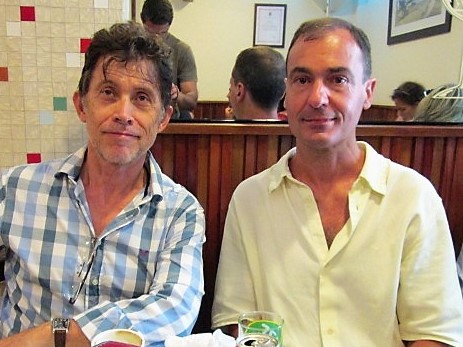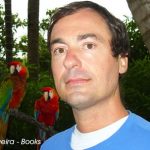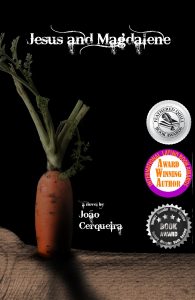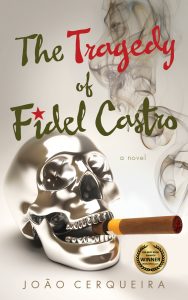An Interview with João Cerqueira, author of Jesus and Magdalene
João Cerqueira has a PhD in History of Art from the University of Oporto. He is the author of eight books, among them the novels The Tragedy of Fidel Castro (Line by Lion Books, 2012), and Jesus and Magdalene (River Grove Books, 2016). In early July, 2017, I met him in his home town of Viana do Castelo, Portugal.
The Tragedy of Fidel Castro won the USA Best Book Awards 2013, the Beverly Hills Book Awards 2014, the Global E-book Awards 2014, was finalist for the Montaigne Medal 2014 and for The Wishing Shelf Independent Book Awards 2014 and was considered by ForewordReviews the third best translation published in 2012 in the United States. Besides the US, it is published in Italy, in the UK, Argentina and in Spain. It was adapted into a play in the United States.
Jesus and Magdalene won the silver medal in the 2015 Latino Book Award, the silver medal in the 2016 Hungry Monster Book Awards, was considered Book of the Year 2016 by Latina Book Club and was considered by the unheard-voice.blogspot one of the best books published in 2015.
The following interview deals mostly with João Cerqueira’s latest novel, Jesus and Magdalene, a hilarious and thought-provoking satire on present-day Portugal, the environmental movement, the social justice movement, and, tangentially, established religion.
Garry Craig Powell: First of all, I’m delighted to see a Portuguese writer featured on Late Last Night Books, and I very much enjoyed reading Jesus and Magdalene in the English translation. Could we begin by talking about the narrative structure? The novel consists of three more or less self-contained sections, which could be read as separate novellas, although I think that together the whole is more than the sum of the parts. I wonder why you decided to tell three different stories consecutively in the novel?
João Cerqueira: Jesus and Magdalene was inspired by three different episodes that happened in Portugal, but could have happened in any part of the world: a group of radical ecologists invaded and destroyed a field with genetic modified corn; a forest that was considered a natural reservation was cut to construct a resort; in a poor neighbourhood there was a racial clash between blacks and gipsies. The idea was to put Jesus – again on earth – into these three problematic situations and to show how men would react. So, I decided that Jesus would first meet a modern Magdalene who is fighting for a better world – albeit using violent methods – that would take him into a journey of conflict and violence. Jesus would ask again for peace and love between men, but men would once more respond aggressively. The idea of the book is that nothing has changed. Human nature cannot be changed and Earth is no place for people like Jesus Christ. It is a place for the violent, the corrupt and the treacherous.
GCP: Let’s talk about each part in some detail, if you don’t mind. In the first part, Jesus and his disciples, including his mother Mary and Mary Magdalene, have returned to our world in the guise of eco-warriors, and their mission is to eradicate genetically-modified crops, in particular what they’ve heard is GMO corn, in what appears to be a rural part of Portugal. The humour derives not only from the ferocity of the farmers, and their ignorance of environmental issues, but equally, and perhaps even more, from the monomania of the disciples, which perhaps represents a kind of urban elitism. They’re quite insensitive to the needs of the farmers, aren’t they?
JC: The main idea is that one: the arrogance of the urban elite before the rural world. The eco-warriors pretend that they are defending the farmers but, in fact, they couldn’t care less about these people. They despise them and think they are ignorant and stupid. So, they patronize the farmers. This is a satire of some ecologists that have never planted a seed or touched a cow. The nature that they know exists only in books and the internet. That is why there is a cultural shock between them and the farmers. But they are not the disciples of Jesus. I used the same names – Judas, John, James, Simon – to create some post-modern artifice or parallelism. Then I have Judas thinking that he knows Jesus from somewhere, he just doesn’t remember where. I hoped to create some humour with this. And the fact that the corn is not modified at all – I put some clues in for the reader – is a way to show that the urban guys are the ones who really are stupid.
GCP: I have to admit that I thought they were Jesus’ disciples; the names fooled me. In any case, I find it funny—and thought-provoking—that some of the eco-warriors, particularly Judas but also James and John, are determined not just to destroy the crops, but to burn absolutely everything. In spite of their ostensibly peaceful and noble aims, they are convinced that the ends justify the means. I wonder if this is an aspect of the environmental movement that you were consciously seeking to satirise?
JC: Yes, of course. The real situation that inspired this first part of the novel was a case of eco-terrorism or just vandalism. For a person like me that was raised on a farm, to see a bunch of fools destroying a corn field – modified or not – is outrageous. Judas, James and John are not only eco-fundamentalists, they are like those anarchists that we see on the news fighting the police and breaking everything because they pretend that they are saving the world from capitalism and globalisation. They are not only violent, they are also hypocritical because they use everything – cell phones, computers, clothes, shoes – that free trade gave them. In today’s world, someone who is against globalisation and wants to be honest, should go to live in shed in the mountains or a desert island.
GCP: In this part, Judas is a strong character, something like a gang leader, as is Magdalene, but Jesus seemed relatively passive, and certainly not the obvious leader of the group that he is in the New Testament. I wonder why you made that choice. Is it that you felt that a Messiah would be less Messianic in our more democratic—or demagogic—age?
JC: In fact, Magdalene could be considered the main character because she is guiding Jesus through the three situations of conflict. Jesus follows her perhaps because he is in love with her. Still, in the climax of the conflicts Jesus always gives his advice on how to solve the problems without violence and how men can understand each other. And, in a hidden away, he always performs the same miracles that he did before: the cure of the crippled, transforming water into wine and a kind of Lazarus-like resurrection, although not with a human being. But if he really returned, Jesus could adapt very well to our democracy because, in my opinion, he was the true inventor of it when he declared that all men were equal.
GCP: This leads me to ask why you chose to make Jesus and other Biblical figures subjects of the satire. Why not simply portray modern-day environmentalists and social justice campaigners?
JC: Like most Portuguese people, I had a traditional Catholic education. I was christened, I went to catechism classes, I was confirmed and I went to mass (was obliged to go) until the age of fourteen. So, from a young age religion has played an important role in my cultural development. I used the figure of Jesus in my previous novel The Tragedy of Fidel Castro to develop reflexions about human nature, good and evil, and life after death, and most of my readers enjoyed the portrait. So, I decided to continue to explore in a literary way the potential of this extraordinary character.
GCP: You explicitly acknowledge the film Jesus of Montreal (which I haven’t seen) as an inspiration. Could you tell us something about that film that evoked a strong response in you? I also wondered, having read Nikos Kazantzakis’ The Last Temptation of Christ (which made a quite a good film too) if that influenced you?
JC: I saw Jesus of Montreal some years ago. It is the story of a street actor who plays Jesus and after having an accident starts to think that he is really Jesus, the saviour. So, mad as he is, he repeats some of the steps of the Passion till he finally dies. I thought I could do something like that in my satirical style and started to read the Bible. But soon I discovered that it was not a good choice. The Last Temptation of Christ is a good movie, but did not influence my novel.
GCP: I read somewhere that José Saramago was an influence, too.
JC: All Portuguese writers have been influenced by him. He is a difficult writer and he doesn’t much respect that literary mantra, show don’t tell. He tells a lot, as Marcel Proust also did. Lobo Antunes and Mário de Carvalho are also important influences on my writing. I am trying now to get as far away as I can from all those writers and have my own style.
GCP: With evident success: I find your style quite unique. In the second section, an unscrupulous property developer teams up with a corrupt mayor and the criminal owners of a construction company, to build an ‘eco-resort’ which will damage the local eco-system, in some unnamed area of Portugal, presumably Trás-os-Montes or Beira Alta. I wonder if this is a phenomenon you’ve observed in your country, the creation of spurious eco-resorts whose only real aim is profit?
JC: Yes, that has happened many times in Portugal. There is a problem with regional politics and local mayors who are often unprepared and succumb easily to corruption. My character is a weak leader who is in charge only because his opponents are even worse than him. He offers food, wine and football to the people and the people elect him. Then an entrepreneur makes an illegal proposal to him, but he rapidly changes the law and gives permission to destroy a protected forest area. Two aggressive contractors also enter this venture and suddenly the mayor loses control of the situation. And when Magdalene and Jesus come to the village he is really in trouble.
GCP: I found this section the most purely comic of the book, perhaps because I have lived in rural Portugal myself, and recognized many of the features you lampoon: the Rabelaisean appetites of the inhabitants, their fanatical devotion to football, and the venality of the local politicians. It’s also in this section that Jesus and Magdalene really come to the fore as characters, since they’ve left the rest of the group to try to prevent an ecological disaster. Magdalene comes across as a very well-meaning and ideologically impeccable woman who sometimes fails to understand the reality of the people she wants to help. She’s a kind of archetypal social worker, isn’t she?
JC: As I have said, Magdalene fails to understand the reality of the people she wants to help because she knows only her world. She, like most people who live in cities, believes that people from the country or from the Third World need to be protected like children. But she can’t connect with the people she wants to help and Romy, the gypsy girl, teaches her a good lesson. By the end of the story, she will discover her own ignorance and in the end the price that she will pay is high.
GCP: It’s also in this section that Jesus’ supernatural powers begin to be felt. He has an uncanny power to influence people, and often acute insights too. I suspect you have a strong admiration for him. He’s certainly very admirable—and I found his dialogue, which is often in the form of direct quotes or paraphrases from the Gospel, amusing too. I hope no one finds it blasphemous. It seemed respectful to me, although I imagine some Catholics will find the portrait of the priest, who not only fails to recognise Christ, but displays a very narrow-minded attitude to religion, quite offensive.
JC: Yes, I have a great admiration for Jesus Christ. Religious people shouldn’t be afraid of humour. Surely God can take a joke. As in The Tragedy of Fidel Castro, I tried to show that religious or political dogmas always lead to fanaticism or dictatorship. Human beings are different from other animals because they have the ability to think, to question things and to laugh. That is why we have democracy and freedom and some cultures do not. Jesus was the first to say that all men are equal and to question the dogmas of the temple rulers. My novel is a form of tribute to him.
GCP: The final section is a kind of modern-day version of Romeo and Juliet. In it the star-crossed lovers are Romy, a gypsy girl, and Julian, a black boy, who live in an inner-city area called New Europe, where blacks and gypsies are involved in a violent conflict. The humour here comes mainly from the similarity of the different ethnic groups’ prejudices about each other, as well as their credulity and superstition. I really thought, and to be honest hoped, that this time Jesus and Magdalene would prevail and bring peace and harmony to the quarter. What happens is both comic and tragic, if I can say that much without giving too much away. Do you think you can get away with tragedy in a satire? It occurs to me that Evelyn Waugh tries to in his novel A Handful of Dust, if you know it. But does it undermine the comedy?
JC: Racism exists in all human groups, although some people think it is the exclusive preserve of whites. In Portugal, blacks and gypsies have a long history of conflicts and violence. Some years ago I saw a shooting on television and I thought that it was in Rio Janeiro. But it was near Lisbon. Jesus and Magdalene are in the middle of this battle and almost succeed in making peace. So, the novel ends in tragic way but the comedy is near all the time. I read a critique of Shakespeare’s work, where it was said, among other qualities, that his genius lay in the subtle movement from comedy to tragedy, catching the reader unawares. Well, this is the same as I’m trying to do. Throughout the novel I try to make the reader laugh, satirizing politics and religion before going on to throw a powerful punch right in the reader’s stomach. I admit it; I want to punch my readers, but before I do, I try to make them laugh.
GCP: Once again, you succeed, on both counts. Do you agree with the dictum (I can’t remember whose) that one can only successfully satirise that which one loves? I ask this because although I recognise many of the absurd features of society that you satirise in this novel, I also love Portugal and Portuguese people, and suspect that you must too.
JC: We can only satirize what we know well. I have a relation of love and hate with my own country. More ‘’hate’’ than love for now…
GCP: Sorry to hear that!
There are strong philosophical undercurrents in the novel as well: Magdalene’s constant references to Thomas More’s Utopia, which functions as a kind of counterpoint to the Biblical allusions, and also a kind of essay on Augustine and Rousseau and their views of human nature (are we born evil or made evil by the environment) which reminded me of Milan Kundera’s philosophical digressions in his fiction. It seems that whereas the function of the realistic novel is largely emotional and cathartic—you want your readers to sympathetically experience what the book’s characters do—the function of the satire is more cerebral. You are really trying to get your audience to think in fresh ways, aren’t you?
JC: I tried to establish a parallelism between the Bible and Utopia. The reader can make his own interpretations: are ethics born from religion or is the word of God unnecessary? The counterpoint between Augustine and Rousseau is something that I think it is very important to understand at the present time. Rousseau blamed society for evil (although he himself put his children in an orphanage) and Augustine spoke about the wrong use of free will. People from the Left tend to sympathize with Rousseau and people from the Right tend to agree with Augustine. I think that Augustine was cleverer and more honest than Rousseau. Although I can agree that the environment is important to form a human being, I have known people from good families, who were rich and with good education that became outlaws. Anyway, I don’t give answers in the novel, I just use humour to make the readers think about these complex matters.
GCP: I think all good literature refuses to give answers; its function is not to preach.
Lastly, since the audience for Late Last Night Books is mostly writers, I’d be interested to hear how you got your work translated and picked up by a foreign publisher. I notice not only that two of your novels are available in English (and at least one of them in Spanish too) but also that you’ve published a lot of short fiction in American journals and magazines as well—including the Toad Suck Review, an incredible coincidence for me, since it was edited by some of my colleagues at the University of Central Arkansas, Mark Spitzer, Terry Wright and John Vanderslice. I wonder why you’ve done that and how easy or hard it has been.
JC: I am not recognised as a writer in my own country for political reasons. I satirize Marxism and Socialism (but also Capitalism) and most of the people in the culture area don’t appreciate this, nor have sense of humour. In Portugal, if you admire Stalin like Saramago, no problem; but if you say that Socialism never worked, then you can have problems. Censorship still exists in my country. So, I needed to look outside. At first I hired a translator, but now I translate my texts myself and then send the manuscripts to an editor. The result has been beyond my best expectations: I won three literary prizes in the US and seven other recognitions, my novel The Tragedy of Fidel Castro has been adapted into a play and I am published also in the UK, Argentina, India, Australia, Spain, Italy and Brazil.
GCP: Could you tell us anything about your original translator? He or she is not credited in the book, at least in the Kindle version of it that I read. I wonder if you are happy with the translation. I was surprised that some of the characters, like Ramsey, had English names, while most had Portuguese ones. I presume that was not the case in the original Portuguese?
JC: My translator was Chris Mingay. He is British and lives in Portugal. He did a good job, but sometimes he had trouble in understanding the poetry of Portuguese language. The editor was Ian Jedlica and also did a great job. Now I think that perhaps the characters should have maintained their Portuguese names.
GCP: Thank you very much for your time. I will look forward to reading your work in future—in Portuguese, I hope! Good luck with Jesus and Magdalene internationally.
JC: It will be translated into Spanish next year. Please see this excerpt in Cleaver Magazine.
https://www.cleavermagazine.com/magdalenes-dream-by-joao-cerqueira/

João Cerqueira (right) with Garry Craig Powell, Viana do Castelo, Portugal, eating the world-famous donuts
Garry Craig Powell
Garry Craig Powell, until 2017 professor of Creative Writing at the University of Central Arkansas, was educated at the universities of Cambridge, Durham, and Arizona. Living in the Persian Gulf and teaching on the women’s campus of the National University of the United Arab Emirates inspired him to write his story collection, Stoning the Devil (Skylight Press, 2012), which was longlisted for the Frank O’Connor International Short Story Award and the Edge Hill Short Story Prize. His short fiction has appeared in Best American Mystery Stories 2009, McSweeney’s, Nimrod, New Orleans Review, and other literary magazines. Powell lives in northern Portugal and writes full-time. His novel, Our Parent Who Art in Heaven, was published by Flame Books in 2022, and is available from their website, Amazon, and all good bookshops.
- Web |
- More Posts(79)


